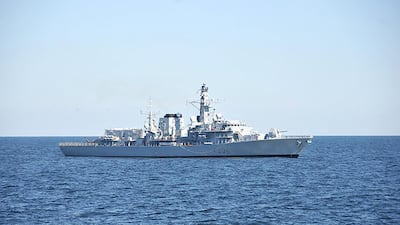A senior British envoy to the Middle East has warned that escalation of tension is the biggest threat to the region and called on all parties to commit to stability.
At a time of global uncertainty, Lt Gen Sir John Lorimer, the UK's senior defence adviser for the Middle East, took to Twitter for a question-and-answer session with The National on a wide range of issues.
Giving his views on regional challenges, the British commander said conflict in Yemen continued to rage despite the coronavirus threat, and that ISIS had tried to use the crisis to rebuild, as The National reported this week.
Gen Lorimer, who previously served as the deputy commander of British forces in Afghanistan, said an increase in tension in the Gulf would have “devastating consequences”.
He said there should be respect for the leading role of the UN in resolving differences in Yemen and elsewhere. Countries such as Britain worked with the UN to promote the peace.
Tension has soared in recent months amid a standoff between Washington and Tehran over Iran’s nuclear ambitions and its attempts to influence events in neighbouring Iraq.
Gen Lorimer said the situation over the past 12 months showed the potent risk of further escalation.
He said all parties must work towards de-escalation and renew focus on regional stability.
“De-escalation is a complex and delicate matter that requires consensus from all parties,” Gen Lorimer said.
“The UN remains the best arbiter as it is an entity that represents all nations equally."
On the threat of terrorism in the region, he confirmed a report in The National that ISIS had tried to take advantage of the coronavirus pandemic to mount a resurgence.
Iraqi security forces, backed by the international coalition to defeat the extremist group, are fighting “tirelessly to contain the threat”, Gen Lorimer said.
He acknowledged that Covid-19 outbreak had necessitated a review of operations but the resolve of the coalition to defeat ISIS remained strong.
Despite its attempts to regroup as the pandemic distracted the region, the ISIS threat was “surmountable”, he said.
In noting the pandemic and its heightened threat to Yemen, Gen Lorimer said the conflict continued “to cause terrible suffering”.
Some of Yemen's most vulnerable groups are at the highest risk of contracting Covid-19, and Gen Lorimer warned the country's healthcare system could collapse if the outbreak worsened.
He praised the UK’s partnerships with Gulf countries as “essential”, not only as pillars of trade and investment but also of British defence and security needs.
Britain’s defence agreements in the Gulf, he said, were “major achievements” that provided economic security and protected shipping lanes.
The global principle of freedom of navigation was something that Britain and its regional partners sought to defend and promote through operations at sea and in the air.
But Gen Lorimer said there was room for greater co-operation, particularly on battling cyber attacks, which pose a threat to infrastructure.
He highlighted the role of Britain's cyber security envoy in working with friends and allies to build resilience to such attacks and ensure partner nations' defences were strengthened.


